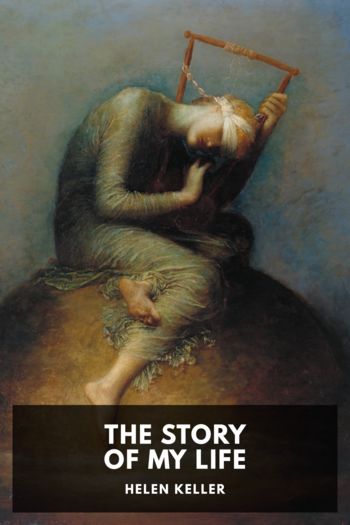The Story of My Life by Helen Keller (books to read for self improvement .TXT) 📕

- Author: Helen Keller
Book online «The Story of My Life by Helen Keller (books to read for self improvement .TXT) 📕». Author Helen Keller
I read King Lear soon after Macbeth, and I shall never forget the feeling of horror when I came to the scene in which Gloster’s eyes are put out. Anger seized me, my fingers refused to move, I sat rigid for one long moment, the blood throbbing in my temples, and all the hatred that a child can feel concentrated in my heart.
I must have made the acquaintance of Shylock and Satan about the same time, for the two characters were long associated in my mind. I remember that I was sorry for them. I felt vaguely that they could not be good even if they wished to, because no one seemed willing to help them or to give them a fair chance. Even now I cannot find it in my heart to condemn them utterly. There are moments when I feel that the Shylocks, the Judases, and even the Devil, are broken spokes in the great wheel of good which shall in due time be made whole.
It seems strange that my first reading of Shakespeare should have left me so many unpleasant memories. The bright, gentle, fanciful plays—the ones I like best now—appear not to have impressed me at first, perhaps because they reflected the habitual sunshine and gaiety of a child’s life. But “there is nothing more capricious than the memory of a child: what it will hold, and what it will lose.”
I have since read Shakespeare’s plays many times and know parts of them by heart, but I cannot tell which of them I like best. My delight in them is as varied as my moods. The little songs and the sonnets have a meaning for me as fresh and wonderful as the dramas. But, with all my love for Shakespeare, it is often weary work to read all the meanings into his lines which critics and commentators have given them. I used to try to remember their interpretations, but they discouraged and vexed me; so I made a secret compact with myself not to try any more. This compact I have only just broken in my study of Shakespeare under Professor Kittredge. I know there are many things in Shakespeare, and in the world, that I do not understand; and I am glad to see veil after veil lift gradually, revealing new realms of thought and beauty.
Next to poetry I love history. I have read every historical work that I have been able to lay my hands on, from a catalogue of dry facts and dryer dates to Green’s impartial, picturesque History of the English People; from Freeman’s History of Europe to Emerton’s Middle Ages. The first book that gave me any real sense of the value of history was Swinton’s World History, which I received on my thirteenth birthday. Though I believe it is no longer considered valid, yet I have kept it ever since as one of my treasures. From it I learned how the races of men spread from land to land and built great cities, how a few great rulers, earthly Titans, put everything under their feet, and with a decisive word opened the gates of happiness for millions and closed them upon millions more: how different nations pioneered in art and knowledge and broke ground for the mightier growths of coming ages; how civilization underwent as it were, the holocaust of a degenerate age, and rose again, like the Phoenix, among the nobler sons of the North; and how by liberty, tolerance and education the great and the wise have opened the way for the salvation of the whole world.
In my college reading I have become somewhat familiar with French and German literature. The German puts strength before beauty, and truth before convention, both in life and in literature. There is a vehement, sledgehammer vigour about everything that he does. When he speaks, it is not to impress others, but because his heart would burst if he did not find an outlet for the thoughts that burn in his soul.
Then, too, there is in German literature a fine reserve which I like; but its chief glory is the recognition I find in it of the redeeming potency of woman’s self-sacrificing love. This thought pervades all German literature and is mystically expressed in Goethe’s Faust:
All things transitory
But as symbols are sent.
Earth’s insufficiency
Here grows to event.
The indescribable
Here it is done.
The Woman Soul leads us upward and on!
Of all the French writers that I have read, I like Molière and Racine best. There are fine things in Balzac and passages in Mérimée which strike one like a keen blast of sea air. Alfred de Musset is impossible! I admire Victor Hugo—I appreciate his genius, his brilliancy, his romanticism; though he is not one of my literary passions. But Hugo and Goethe and Schiller and all great poets of all great nations are interpreters of eternal things, and my spirit reverently follows them into the regions where Beauty and Truth and Goodness are one.
I am afraid I have written too much about my book-friends, and yet I have mentioned only the authors I love most; and from this fact one might easily suppose that my circle of friends was very limited and undemocratic, which would be a very wrong impression. I like many writers for many reasons—Carlyle for his ruggedness and scorn of shams; Wordsworth, who teaches the oneness of man and nature; I find an exquisite pleasure in the oddities and surprises of Hood, in Herrick’s quaintness and the palpable





Comments (0)